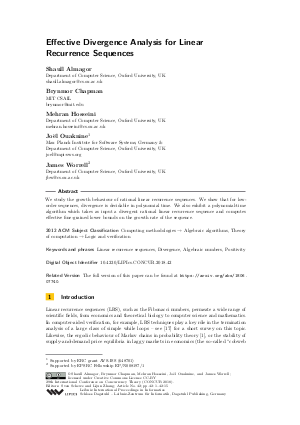Effective Divergence Analysis for Linear Recurrence Sequences
Authors Shaull Almagor, Brynmor Chapman, Mehran Hosseini, Joël Ouaknine, James Worrell
-
Part of:
Volume:
29th International Conference on Concurrency Theory (CONCUR 2018)
Part of: Series: Leibniz International Proceedings in Informatics (LIPIcs)
Part of: Conference: International Conference on Concurrency Theory (CONCUR) - License:
 Creative Commons Attribution 3.0 Unported license
Creative Commons Attribution 3.0 Unported license
- Publication Date: 2018-08-31
File

PDF
LIPIcs.CONCUR.2018.42.pdf
- Filesize: 0.53 MB
- 15 pages
Document Identifiers
Related Versions
Subject Classification
ACM Subject Classification
- Computing methodologies → Algebraic algorithms
- Theory of computation → Logic and verification
Keywords
- Linear recurrence sequences
- Divergence
- Algebraic numbers
- Positivity
Metrics
- Access Statistics
-
Total Accesses (updated on a weekly basis)
0PDF Downloads0Metadata Views
Abstract
We study the growth behaviour of rational linear recurrence sequences. We show that for low-order sequences, divergence is decidable in polynomial time. We also exhibit a polynomial-time algorithm which takes as input a divergent rational linear recurrence sequence and computes effective fine-grained lower bounds on the growth rate of the sequence.
Cite As Get BibTex
Shaull Almagor, Brynmor Chapman, Mehran Hosseini, Joël Ouaknine, and James Worrell. Effective Divergence Analysis for Linear Recurrence Sequences. In 29th International Conference on Concurrency Theory (CONCUR 2018). Leibniz International Proceedings in Informatics (LIPIcs), Volume 118, pp. 42:1-42:15, Schloss Dagstuhl – Leibniz-Zentrum für Informatik (2018)
https://doi.org/10.4230/LIPIcs.CONCUR.2018.42
BibTex
@InProceedings{almagor_et_al:LIPIcs.CONCUR.2018.42,
author = {Almagor, Shaull and Chapman, Brynmor and Hosseini, Mehran and Ouaknine, Jo\"{e}l and Worrell, James},
title = {{Effective Divergence Analysis for Linear Recurrence Sequences}},
booktitle = {29th International Conference on Concurrency Theory (CONCUR 2018)},
pages = {42:1--42:15},
series = {Leibniz International Proceedings in Informatics (LIPIcs)},
ISBN = {978-3-95977-087-3},
ISSN = {1868-8969},
year = {2018},
volume = {118},
editor = {Schewe, Sven and Zhang, Lijun},
publisher = {Schloss Dagstuhl -- Leibniz-Zentrum f{\"u}r Informatik},
address = {Dagstuhl, Germany},
URL = {https://drops.dagstuhl.de/entities/document/10.4230/LIPIcs.CONCUR.2018.42},
URN = {urn:nbn:de:0030-drops-95802},
doi = {10.4230/LIPIcs.CONCUR.2018.42},
annote = {Keywords: Linear recurrence sequences, Divergence, Algebraic numbers, Positivity}
}
Author Details
- Max Planck Institute for Software Systems, Germany & , Department of Computer Science, Oxford University, UK
Funding
- Ouaknine, Joël: Supported by ERC grant AVS-ISS (648701)
- Worrell, James: Supported by EPSRC Fellowship EP/N008197/1
References
-
S. Akshay, Timos Antonopoulos, Joël Ouaknine, and James Worrell. Reachability problems for Markov chains. Inf. Process. Lett., 115(2):155-158, 2015.

-
Alan Baker and Gisbert Wüstholz. Logarithmic forms and group varieties. J. reine angew. Math, 442(19-62):3, 1993.

-
W. J. Baumol. Economic Dynamics. An Introduction. Macmillan, 1970.

-
Jacek Bochnak, Michel Coste, and Marie-Françoise Roy. Real algebraic geometry, volume 36. Springer Science &Business Media, 2013.

-
Mark Braverman. Termination of integer linear programs. In Computer Aided Verification, 18th International Conference, CAV 2006, Seattle, WA, USA, August 17-20, 2006, Proceedings, pages 372-385, 2006.

-
John W.S. Cassels. An Introduction to Diophantine Approximation. Cambridge University Press, 1965.

-
Henri Cohen. A course in computational algebraic number theory, volume 138. Springer Science &Business Media, 2013.

-
Thomas W Cusick and Mary E Flahive. The Markoff and Lagrange spectra. Number 30 in Mathematical Surveys and Monographs. American Mathematical Soc., 1989.

-
Graham Everest, Alfred J. van der Poorten, Igor E. Shparlinski, and Thomas Ward. Recurrence Sequences, volume 104 of Mathematical surveys and monographs. American Mathematical Society, 2003.

-
J.-H. Evertse. On sums of S-units and linear recurrences. Compositio Math., 53(2):225-244, 1984.

-
David W Masser. Linear relations on algebraic groups. New Advances in Transcendence Theory, pages 248-262, 1988.

-
M. Mignotte. A note on linear recursive sequences. J. Austral. Math. Soc., 20(2):242-244, 1975.

-
Ivan Morton Niven. Diophantine approximations. Courier Corporation, 2008.

-
Joël Ouaknine and James Worrell. On the positivity problem for simple linear recurrence sequences,. In Automata, Languages, and Programming - 41st International Colloquium, ICALP 2014, Copenhagen, Denmark, July 8-11, 2014, Proceedings, Part II, pages 318-329, 2014.

-
Joël Ouaknine and James Worrell. Positivity problems for low-order linear recurrence sequences. In Proceedings of the Twenty-Fifth Annual ACM-SIAM Symposium on Discrete Algorithms, SODA 2014, Portland, Oregon, USA, January 5-7, 2014, pages 366-379, 2014.

-
Joël Ouaknine and James Worrell. Ultimate positivity is decidable for simple linear recurrence sequences. In Automata, Languages, and Programming - 41st International Colloquium, ICALP 2014, Copenhagen, Denmark, July 8-11, 2014, Proceedings, Part II, pages 330-341, 2014.

-
Joël Ouaknine and James Worrell. On linear recurrence sequences and loop termination. SIGLOG News, 2(2):4-13, 2015.

-
James Renegar. On the computational complexity and geometry of the first-order theory of the reals. part i: Introduction. preliminaries. the geometry of semi-algebraic sets. the decision problem for the existential theory of the reals. Journal of symbolic computation, 13(3):255-299, 1992.

-
T. N. Shorey and C. L. Stewart. On the Diophantine equation ax^2t + bx^ty + cy² = d and pure powers in recurrence sequences. Math. Scand., 52(1):24-36, 1983.

-
Alfred Tarski. A decision method for elementary algebra and geometry. Bulletin of the American Mathematical Society, 59, 1951.

-
A. J. van der Poorten and H. P. Schlickewei. Additive relations in fields. J. Austral. Math. Soc. Ser. A, 51(1):154-170, 1991.

